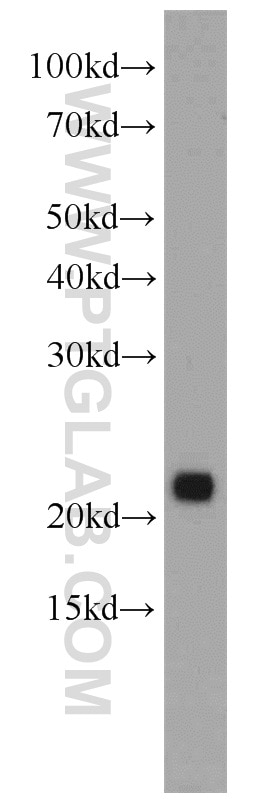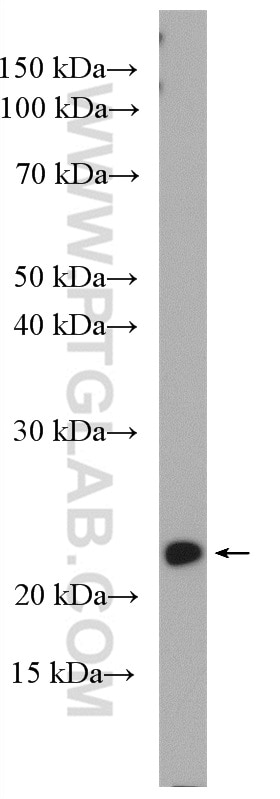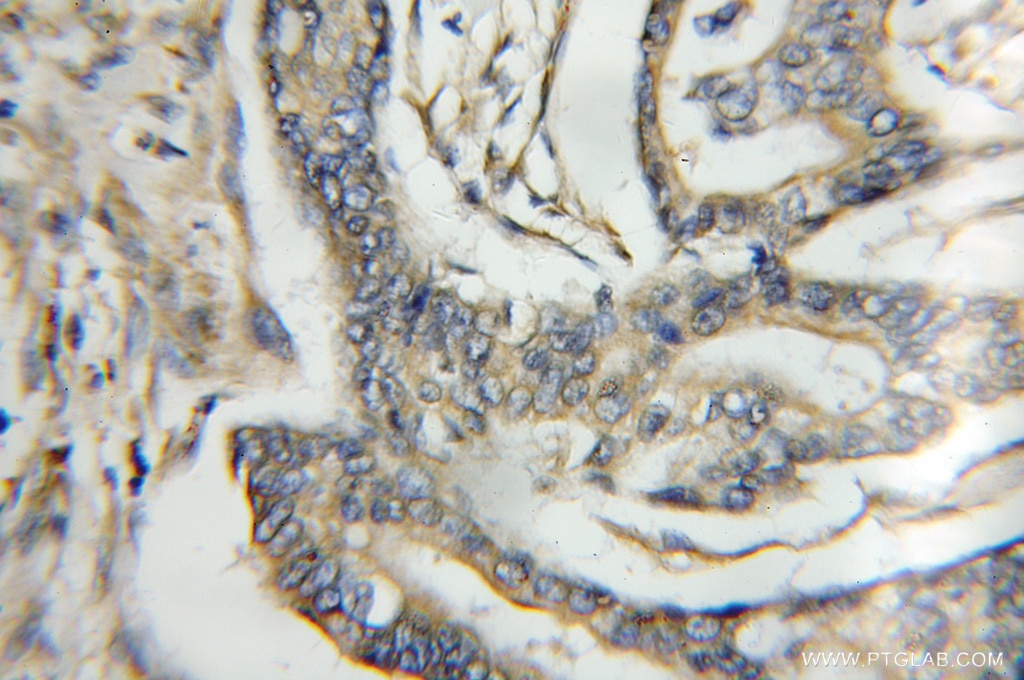- Phare
- Validé par KD/KO
Anticorps Polyclonal de lapin anti-PTPMT1
PTPMT1 Polyclonal Antibody for WB, IHC, ELISA
Hôte / Isotype
Lapin / IgG
Réactivité testée
Humain, rat, souris
Applications
WB, IF, IHC, ELISA
Conjugaison
Non conjugué
N° de cat : 11493-1-AP
Synonymes
Galerie de données de validation
Applications testées
| Résultats positifs en WB | tissu pancréatique de souris, tissu pancréatique de rat |
| Résultats positifs en IHC | tissu de cancer du pancréas humain il est suggéré de démasquer l'antigène avec un tampon de TE buffer pH 9.0; (*) À défaut, 'le démasquage de l'antigène peut être 'effectué avec un tampon citrate pH 6,0. |
Dilution recommandée
| Application | Dilution |
|---|---|
| Western Blot (WB) | WB : 1:200-1:1000 |
| Immunohistochimie (IHC) | IHC : 1:20-1:200 |
| It is recommended that this reagent should be titrated in each testing system to obtain optimal results. | |
| Sample-dependent, check data in validation data gallery | |
Applications publiées
| KD/KO | See 1 publications below |
| WB | See 5 publications below |
| IHC | See 1 publications below |
| IF | See 1 publications below |
Informations sur le produit
11493-1-AP cible PTPMT1 dans les applications de WB, IF, IHC, ELISA et montre une réactivité avec des échantillons Humain, rat, souris
| Réactivité | Humain, rat, souris |
| Réactivité citée | Humain, souris |
| Hôte / Isotype | Lapin / IgG |
| Clonalité | Polyclonal |
| Type | Anticorps |
| Immunogène | PTPMT1 Protéine recombinante Ag2063 |
| Nom complet | protein tyrosine phosphatase, mitochondrial 1 |
| Masse moléculaire calculée | 201 aa, 23 kDa |
| Poids moléculaire observé | 21-23 kDa |
| Numéro d’acquisition GenBank | BC020242 |
| Symbole du gène | PTPMT1 |
| Identification du gène (NCBI) | 114971 |
| Conjugaison | Non conjugué |
| Forme | Liquide |
| Méthode de purification | Purification par affinité contre l'antigène |
| Tampon de stockage | PBS avec azoture de sodium à 0,02 % et glycérol à 50 % pH 7,3 |
| Conditions de stockage | Stocker à -20°C. Stable pendant un an après l'expédition. L'aliquotage n'est pas nécessaire pour le stockage à -20oC Les 20ul contiennent 0,1% de BSA. |
Informations générales
Protein Tyrosine Phosphatase localized to the Mitochondrial 1 (PTPMT1) is a highly conserved, dual-specific phosphatase that resides on the matrix-facing side of the inner mitochondrial membrane (IMM). PTPMT1 is a mitochondrial phosphatase and a vital regulator of mitochondrial activities. Current work points to roles for PTPMT1 in the regulation of mitochondrial respiration, dynamics, and ultrastructure through the modulation of pyruvate importation, the tuning of TCA cycle activity, and the synthesis of cardiolipin. PTPMT1 is highly expressed in pancreatic b cells, whose mitochondria have the important function of coupling glucose metabolism to the secretion of insulin. (PMID: 16337125, PMID: 16061174, PMID: 33335799)
Protocole
| Product Specific Protocols | |
|---|---|
| WB protocol for PTPMT1 antibody 11493-1-AP | Download protocol |
| IHC protocol for PTPMT1 antibody 11493-1-AP | Download protocol |
| Standard Protocols | |
|---|---|
| Click here to view our Standard Protocols |
Publications
| Species | Application | Title |
|---|---|---|
Cell Death Dis 4EBP1 senses extracellular glucose deprivation and initiates cell death signaling in lung cancer | ||
Mol Cell Biol A critical role of mitochondrial phosphatase Ptpmt1 in embryogenesis reveals a mitochondrial metabolic stress-induced differentiation checkpoint in embryonic stem cells. | ||
Cell Rep Genome-wide CRISPR-Cas9 knockout library screening identified PTPMT1 in cardiolipin synthesis is crucial to survival in hypoxia in liver cancer.
| ||
Am J Physiol Cell Physiol PTPMT1 protect cardiomyocytes from necroptosis induced by γ-ray irradiation through alleviate mitochondria injury | ||
Adv Sci (Weinh) Phosphorylated SHMT2 Regulates Oncogenesis Through m6 A Modification in Lung Adenocarcinoma |
Avis
The reviews below have been submitted by verified Proteintech customers who received an incentive forproviding their feedback.
FH Tongbin (Verified Customer) (08-25-2020) | This antibody detects PTPMT1 in mouse heart samples.
|




